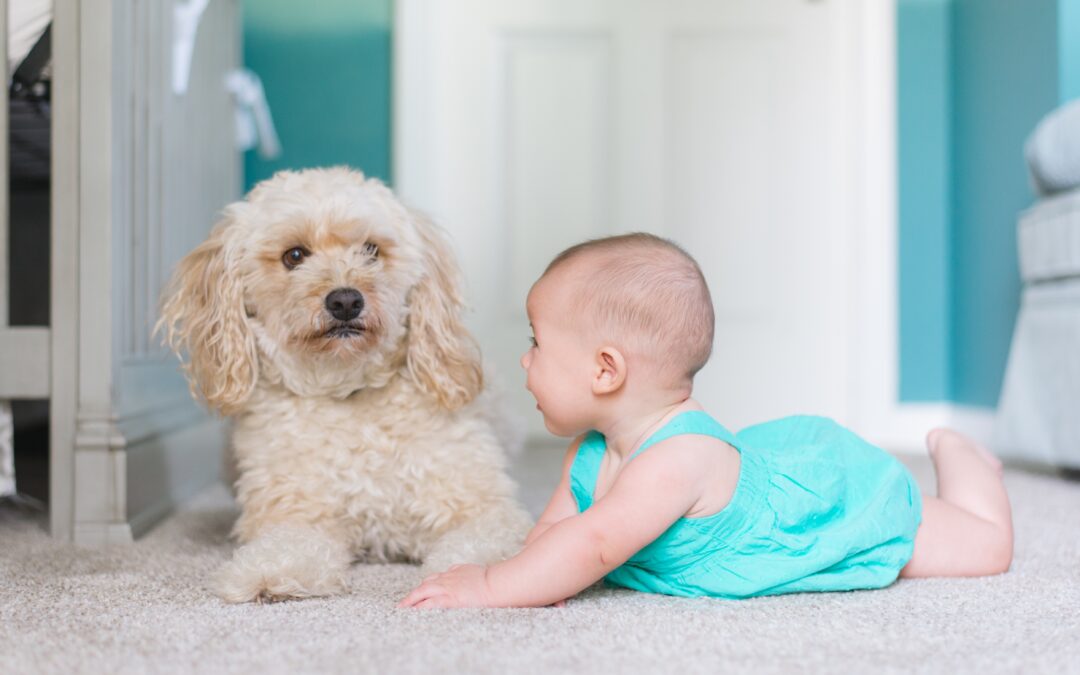Having a new baby arriving can be a super busy and exciting time for the family, but we must not forgot the existing furry family members and factoring in how to help them adjust to the new situation. The sooner you begin preparing your dog or cat for the baby’s arrival the better and the less stressful the transition can be.
With the arrival of Dr Sarah’s baby next month, she is currently getting her two dogs, Paddy and Benji, ready for the new baby so we thought it a good time to share some of the tips with our DVS community.
There are a number of tips that will help with the transition:
- Start to make schedule changes that you predict may be similar to what will happen after baby arrives – eg. One period of undivided attention of fetch or playtime that can happen when baby is sleeping rather than constant attention all the time
- Basic manners go a long way to helping make everyone’s lives less stressful. Teaching your dog to sit, stay and settle are important skills to help with excitement and it will prove useful teaching your dog to lie down whenever you are in your nursing chair. Leave it and drop it are also important manners to learn so that you can instruct your dog to drop a child’s toy, this helps avoid the dog chewing and swallowing parts of the toy that may result in veterinary visits for potential foreign bodies.
- Begin to teach your dog and/or cat to stay off beds and furniture where baby will spend time to avoid accidental injuries and your pet landing on your baby unexpectedly. This also goes for if your pet spends a lot of time sitting on your lap start training them to sit beside you rather than on you where baby will be sitting.
- Teach your dog to have a safe space – develop an area that you plan on being the dog’s safe place where they can go to get away from the child and will not be disturbed, this may be a dog bed or crate in another room or in the corner of the lounge.
- Desensitizing your dog or cat to the sounds of a baby – eg.CD with sounds of crying, having a baby doll that makes noise can also be a helpful desensitizing object and reward your dog for being calm around the doll. After baby’s arrival bring home a blanket from the hospital with the smell of your new baby on it will help familiarize your dog the the scent when they are introduced in a few days’ time.
Bringing the baby home for the first time – allow other people to go inside first and let your pet express their normal excitement for your arrival then once calmer place a leash on. Have some treats ready with the person holding the lead. It is important to stay calm as if your dog senses that you are nervous about the introduction they will become nervous too. The person with the dog should give some basic commands the dog knows like sit or drop to have the dogs’ attention and focus. Once focus is gained allow the dog to look at/engage with the baby eg. Sniff baby’s feet and then reward for calm polite behavior, if the dog is over excited then step back and calm them with basic commands again. There does not need to be full interaction between the dog and the baby on the first meeting this may take time. Avoid punishing or scolding the dog during this process as we want the dog to associate the baby with good things.
It is however important that you never leave even the most well behaved pet alone with babies or children.
There are helpful guides with more details about the process. Books such as ‘Tell your dog your pregnant’ and ‘Tell your cat your pregnant’ are available from Direct Vet Services and include a CD with sounds to help your pet become ready for the new family member.

